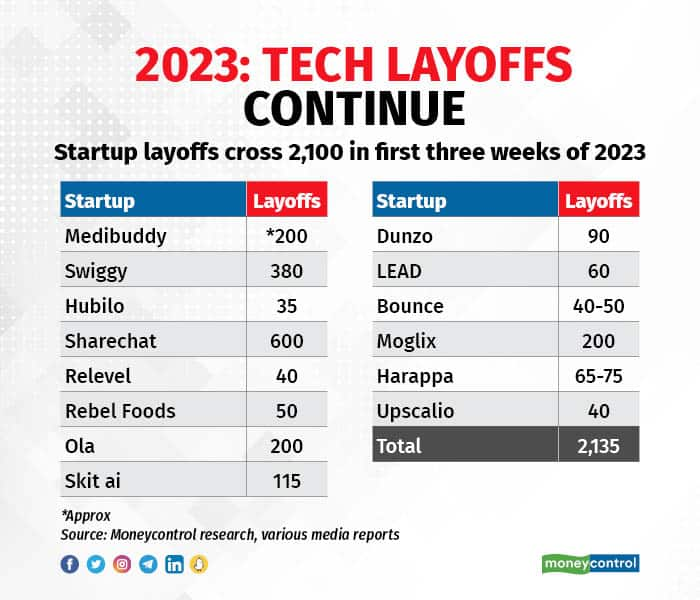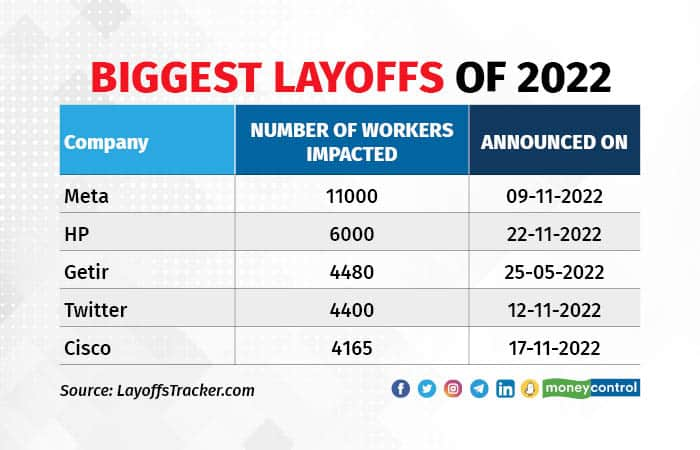



About 14 startups in India have laid off over 2,100 employees in the first three weeks of 2023, according to data compiled by Moneycontrol.
The number of layoffs in this period has crossed last year’s three-week average of around 1,060, as more companies take up the layoff route in an attempt to stay afloat amidst a funding winter.
Further, thousands of Indian IT professionals in the US, who have lost their jobs due to the series of recent layoffs at companies like Google, Microsoft and Amazon, are now struggling to find new employment within the stipulated period in their work visas.
Though anticipating layoffs in a company might not be easy for employees, HR and career experts feel there are a few red flags employees, especially freshers, should notice before the ship sinks.
Check the project you are inBefore joining a firm, the first and foremost check is about the role and project the candidate is going to be engaged in.
“Most startups and MNCs may hire for a role/project which may be at the nascent stage. For them, the technology or the role itself would be evolving,” career coach Senthil Kumar Venugopal told Moneycontrol.
ALSO READ | Ashneer Grover’s suggestion to avoid layoffs: Band-aid or long-term solution?Since the domain is new for the firm, they would prefer hiring candidates with that expertise. Venugopal suggests checking three things: You would be heading this project. This may look fancy and very attractive. The trap is it will start and end with you.
Secondly, you should build the team from scratch. The firm may give you the feel of a leader and most of the time, no hiring may happen. You will be asked to manage the existing team, whom you would need to educate this subject on a daily basis.
 Startup layoffs cross 2,100 in first three weeks of 2023
Startup layoffs cross 2,100 in first three weeks of 2023And, thirdly, the firm will say it is planning to expand the business in this technology. This is something new, and the firm might say that it wants to try this with existing customers or some new trends they are hearing about in the market.
“Join only if there is an existing business and team members with more than two years working on this project,” Venugopal said, adding, “When business exists, problems exist. Eventually, people would exist in any organisation.”
Different checks for MNCs and startupsEven before researching the company, HR experts suggested researching the industry. According to Amit Sharma, an HR leader in a multinational IT firm, high-risk sectors at present are consumer-facing (FMCG, direct selling) financial services (Banks, PE etc.), discretionary income-based (travel and luxury) and B2B companies (tech, consulting etc.)
“And there are stable recession-proof industries which cater to necessities like pharma, telecom, defence, etc.,” he said.
ALSO READ | ‘Quiet Hiring’: When employees are transferred internally or temps are brought inHR experts suggested that one could always research how the company has responded to difficult external factors in the past, history of layoffs and what current and ex-employees are saying about the company.
For MNCs, Sharma recommended reading annual reports and investor analyses. “Focus on sections like business risks, attrition and leadership changes. Look for trends in R&D expenditure, employee learning investment costs, etc., that hint at stability.”
Here, tracking past lay-off data, average bonus pay-outs and increment percentages in the past year is also significant. “If a company hasn't paid bonuses or given low increments, that is a red flag,” Sharma said.

For startups, he said it is important to check funding scenarios, business models, and their dependency on other platforms like Amazon or Apple or policy loopholes.
Secondly, evaluate growth in the employee base. “The ideal scenario is steady employee growth every year. No growth or absurd growth are both red flags.”
Thirdly, candidates need to check how difficult the salary negotiation was. “If you asked for a 100 percent increment and they agreed to it at the drop of a hat, it is a big red flag,” he said, highlighting, “Ask all the IT guys who got triple digit increments!”
Different checks for freshers and experiencedThere are two ways people join an organisation: fresh candidates through campus placements and working professionals looking for a job or career change, and professional growth.
According to R P Yadav, CMD of HR consultancy firm Genius Consultants, freshers should always analyse the history of the company in terms of its fresher hiring. They should check this: ‘do they have a trend of laying off freshers within the first year or not?’
IT major Wipro has let go of 452 freshers it had made offers to but had not onboarded yet. The freshers were allowed to go as they “repeatedly performed poorly in assessments even after training,” the company said.
ALSO READ | Silver lining amid startup lay-offs: Sectors hiring for recently axed rolesThe second category of job-seekers, the professionals, should opt for change, only if it is very much necessary to make a career change, Yadav asserted. Even if you want to switch in the current environment, due diligence should be done in terms of company size, products offered in the market and its market share.
“In addition, company ratings are nowadays available on public platforms. Positive and good ratings reflect the professionalism of the organisation and you get an understanding of how the facility is managed and how good is the growth,” Yadav added.
Evaluate reasons for retentionCareer experts believe professional satisfaction comes from three major sources: boss, organisational culture, and growth opportunities.
“Firstly, a boss is an individual who will have the most influence, and impact over your career’s progression,” said career coach and expert Sawan Kapoor, adding, “They know how to separate the human being that you are from the failing event that happened.”
Secondly, organisational culture and core values are principles that apply to everyone who works at the firm.
“And they would suffer a financial loss to uphold it, and even fire an employee for not following them. Furthermore, the culture of a company defines how they will behave in the situations they face,” Kapoor said.
ALSO READ | Laid off? Here’s how to land the next jobThirdly, he said an employee who knows he or she can grow with an organisation is much more engaged with their work than one who does not have this clarity.
Discover the latest Business News, Sensex, and Nifty updates. Obtain Personal Finance insights, tax queries, and expert opinions on Moneycontrol or download the Moneycontrol App to stay updated!
Find the best of Al News in one place, specially curated for you every weekend.
Stay on top of the latest tech trends and biggest startup news.